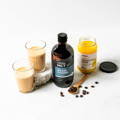After about a week of starting your keto diet plan, you may experience the ‘keto flu’.
The ‘keto flu’ refers to a range of symptoms you may experience as a result of changing your diet and entering ketosis.
Symptoms include brain fog, nausea, headaches, irritability, difficulty sleeping and constipation.
The best way to manage these symptoms is to give your body time to adjust to your new keto diet. Keep your fluids up, eat regularly, move your body and don’t make any sudden changes.
While uncomfortable, these feelings are only temporary, and once you move through them, you’ll be able to experience the true benefits of the ketogenic diet.
If symptoms persist and you’re feeling concerned, it’s best to consult your health practitioner to make sure there aren’t any underlying causes.








